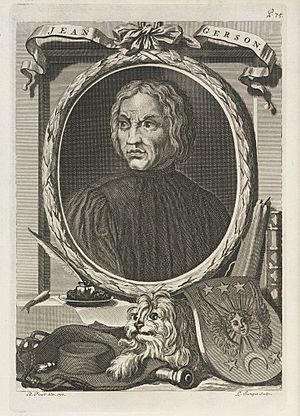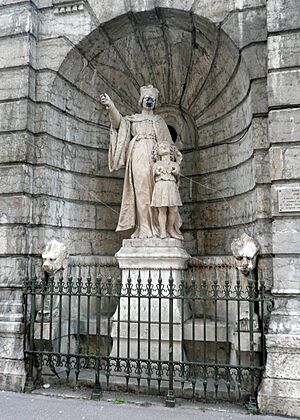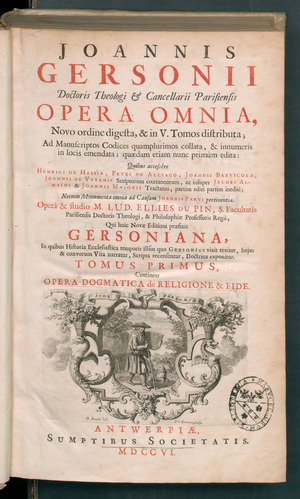Jean Gerson facts for kids
Quick facts for kids
Jean Charlier de Gerson
|
|
|---|---|

Posthumous engraving, by Bernard Picart, 1714
|
|
| Born | 13 December 1363 Gerson-lès-Barby, Champagne,
Kingdom of France |
| Died | 12 July 1429 (aged 65) Lyon, Kingdom of France
|
| Nationality | French |
| Occupation | Scholar, educator, reformer, poet |
Jean Charlier de Gerson (born December 13, 1363 – died July 12, 1429) was an important French thinker. He was a scholar, teacher, reformer, and poet. He also served as the Chancellor of the University of Paris.
Gerson was a key leader in the conciliar movement. This movement believed that a general council of the church should have more power than the Pope. He was also a major expert at the Council of Constance. He was one of the first people to talk about "natural rights". These are rights that everyone has just by being human. Gerson also famously defended Joan of Arc. He said her special calling was real and from God.
When he was 14, Gerson left his hometown of Gerson-lès-Barby. He went to study at the college of Navarre in Paris. There, he learned from Gilles Deschamps and Pierre d'Ailly. Pierre d'Ailly became his close friend for life.
Contents
Early Life and Education
Jean Gerson was born in Gerson-lès-Barby. This was a small village in what is now Barby, Ardennes, France. His parents, Arnulphe Charlier and Élisabeth de la Chardenière, were religious farmers. Seven of their twelve children chose a religious life.
Jean, the oldest, was sent to Paris at age 14. He attended the famous college of Navarre. After five years, he earned a degree in arts. Then, he started studying theology. His teachers included Gilles Deschamps and Pierre d'Ailly. Pierre d'Ailly was the head of the college and later became a cardinal. He remained Gerson's friend and mentor.
Gerson and the University of Paris
Gerson quickly became well-known at the university. He was chosen to represent the French students in 1383 and 1384. In 1384, he earned his bachelor's degree in theology. Three years later, he received an even greater honor. He was sent to represent the university in a case before the Pope.
This case involved John of Montson, a Dominican scholar. John had taught that the Virgin Mary was born with original sin. The university disagreed and removed him. John appealed to Pope Clement VII in Avignon. Gerson and other university delegates supported the university's right to decide its own teachers. From this time on, Gerson worked hard to improve universities. He also wanted to reform the clergy and end the Western Schism. This was a time when the church had more than one Pope.
Gerson became famous as a preacher in Paris in the early 1390s. In 1392, he earned his licentiate degree. He received his doctorate in theology in 1394. In 1395, at just 32 years old, he was elected Chancellor of the University of Paris. He also became a canon of Notre Dame Cathedral.
The University of Paris was very important at this time. Its Chancellor was a powerful person in France and Europe. Gerson's job was to protect the university's rights. He also guided the studies of many students from across Europe. His writings show how seriously he took his duties. He spent his life writing. His work focused on three main areas:
- Reforming university studies.
- Planning to end the Great Schism.
- Writing devotional books later in life.
Gerson's Writings and Ideas
Gerson wanted to make university studies simpler and more spiritual. He wanted to add "evangelical warmth" to them. During this time, he was called Doctor Christianissimus, meaning "Most Christian Doctor." Later, his devotional writings earned him the title Doctor Consolatorius, or "Comforting Doctor."
His goal was to make theology clear and practical. He believed in a "mystical theology." This was different from purely scientific theology. He wanted people to focus on studying the Bible and the early Church Fathers. He also warned against disrespectful writings like the Romance of the Rose. He often felt tired of being Chancellor. It brought him conflicts and money problems. He longed for a quiet life of study.
In 1402, Gerson wrote De Vita Spirituali Animae. This was one of the first attempts to develop the idea of natural rights. He thought that freedom could be traded like property.
Gerson and the Great Schism
Gerson's most important work was trying to heal the Western Schism. This was a major split in the Catholic Church. In 1378, Pope Gregory XI died in Rome. After his death, there were two people claiming to be the Pope. One was in Rome and one was in Avignon, France. This caused great confusion because the Church should only have one leader.
France had a strong influence over the Popes for a long time. So, the French king supported the Pope in Avignon. This helped the schism grow. Many religious French people felt responsible for this division. Gerson, Pierre d'Ailly, and others worked hard to end it.
The University of Paris, led by Gerson and others, decided on three ways to end the schism:
- Cession: Both Popes would give up their office.
- Arbitration: A neutral group would decide.
- General Council: A meeting of church leaders would resolve the issue.
When Pope Clement VII died, the French king asked that no new Pope be elected. But the cardinals elected a new one first. Still, both new Popes in Rome and Avignon promised to step down if the other did.
By 1398, most cardinals and European rulers supported a general council. Gerson wrote many pamphlets during this time. He hoped for a peaceful solution. But the Popes refused to cooperate. This made the idea of a council even stronger.
A council was planned to meet in Pisa. Gerson wrote many guides for it. He argued that a general council could restore the Church's unity. The council met and removed both Popes. They then elected Alexander V. Gerson spoke to the new Pope about his duties.
However, the new Pope's actions disappointed everyone. He favored the Franciscan Order too much. He issued a rule that hurt parish priests and universities. The University of Paris, led by Gerson, protested strongly. The Pope died soon after. John XXIII was elected. Instead of peace, the Council of Pisa had created a third Pope! Pierre d'Ailly lost hope in councils. But Gerson kept fighting.
Gerson also fought against the violence in French politics. The powerful families of Orleans and Burgundy were fighting. Louis I, Duke of Orléans, the king's brother, was murdered. A theologian named Jean Petit publicly said the murder was justified. Gerson had Petit's ideas condemned by the University of Paris. The book was even burned in front of Notre Dame. Gerson wanted a council to confirm this condemnation.
His efforts were strongly supported by Emperor Sigismund. This led to the important Council of Constance. Gerson was very influential at this council. He helped guide the removal of John XXIII. He also directed the condemnation of Jan Hus. Some people find it hard to understand why Gerson condemned Hus. This is because Gerson seemed to support the idea of a council being above the Pope. However, Gerson believed a council was only supreme in emergencies. He was not a radical reformer.
The Council of Constance, which made Gerson famous, also led to his downfall. The council, influenced by the Duke of Burgundy, did not fully condemn Jean Petit's ideas. The justification of murder was called just an opinion. Only one of Petit's ideas was condemned. Even this was later canceled by the new Pope, Martin V. Gerson feared returning to France because the Duke of Burgundy was in power. He lived in exile in Constance and then in Tirol. There, he wrote his famous book De consolatione theologiae.
Devotion to Saint Joseph
In 1407, Louis I, Duke of Orléans was murdered in Paris. This was ordered by John the Fearless, Duke of Burgundy. Jean Petit, a lawyer, argued that the murder was justified. Gerson strongly spoke out against Petit's ideas. He tried to have the idea of "tyrannicide" (killing a tyrant) condemned. This made the powerful Duke of Burgundy his enemy.
During a revolt in 1413, Gerson's house in Paris was robbed. He only escaped being killed by hiding in the roof of Notre-Dame Cathedral for two months. Gerson believed he was saved by the protection of Saint Joseph.
After this escape, Gerson began to promote devotion to Saint Joseph. He wrote a long book in French called Consideration sur Saint Joseph. His long Latin poem, the Josephina, also praised the saint. It helped spread devotion to Joseph across Europe. People often pictured Saint Joseph as an old man. But Gerson argued that Joseph must have been young and strong. He needed to be able to support and protect the Holy Family. Gerson described Jesus during the Flight into Egypt as "a fugitive and a foreigner." In 1416, at the Council of Constance, Gerson asked for a special feast day. This day would honor the marriage of Mary and Joseph. He even wrote a special prayer service for it.
Later Life and Retirement
When Gerson returned to France, he went to Lyon. His brother was the head of the Celestine monastery there. Gerson had retired from university life. But his decade in Lyon was a very productive time for his writing.
He created a harmony of the gospels called the Monotesseron. He also wrote works about Bible poems. This included a large collection of twelve writings on the Magnificat. He wrote a commentary on the Song of Songs. He also had many letters with members of the Carthusian order. These letters discussed mysticism and spiritual life.
Shortly before he died, he wrote a paper supporting Joan of Arc. It is said that he taught a school for boys and girls in Lyon. His only payment was for the children to promise to say the prayer, "Lord, have mercy on thy poor servant Gerson." However, some historians question this story. Jean Gerson died in Lyon on July 12, 1429.
Modern Editions and Translations
- A modern collection of Gerson's works in French and English is: Jean Gerson, Oeuvres Complètes, edited by Palémon Glorieux, 10 volumes (Paris, 1960–1973).
- Older important editions include those by Edmond Richer (3 volumes, Paris, 1606) and Ellies Dupin (5 volumes, Antwerp, 1706).
- The Consolation of Theology = De consolatione theologiae, edited and translated by CL Miller, (New York: Abaris Books, 1998).
- For English translations of some early works, see Brian Patrick McGuire (translator), Jean Gerson: Early Works, Classics of Western Spirituality, (New York, 1988).
- Jean Gerson: Selections from A Deo exivit, Contra curiositatem studentium and De mystica theologia speculativa, introduced, edited, translated and annotated by Steven E. Ozment, (Leiden: E. J. Brill, 1969).
External Resources
- Conclusiones de diversis materiis moralibus, sive De regulis mandatorum From the Rare Book and Special Collections Division at the Library of Congress
See also
 In Spanish: Juan Gerson para niños
In Spanish: Juan Gerson para niños
 | Delilah Pierce |
 | Gordon Parks |
 | Augusta Savage |
 | Charles Ethan Porter |



